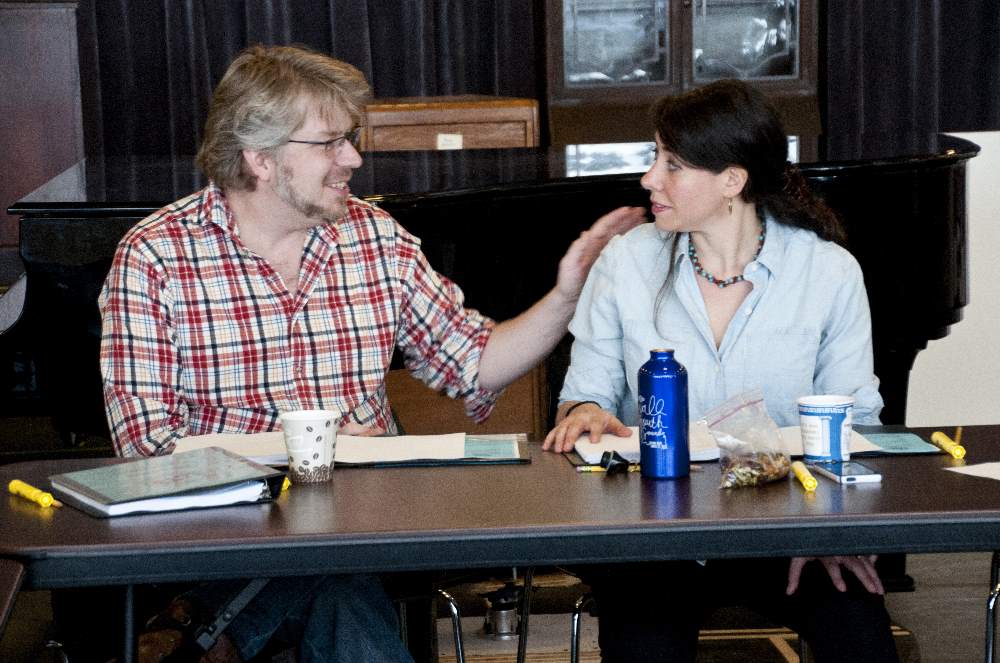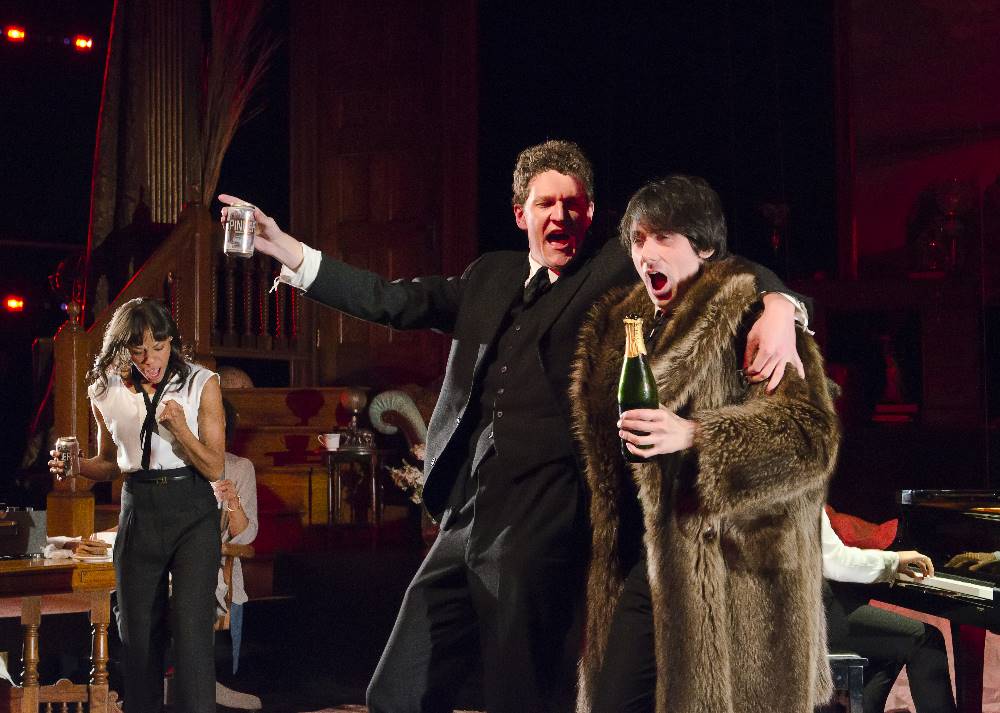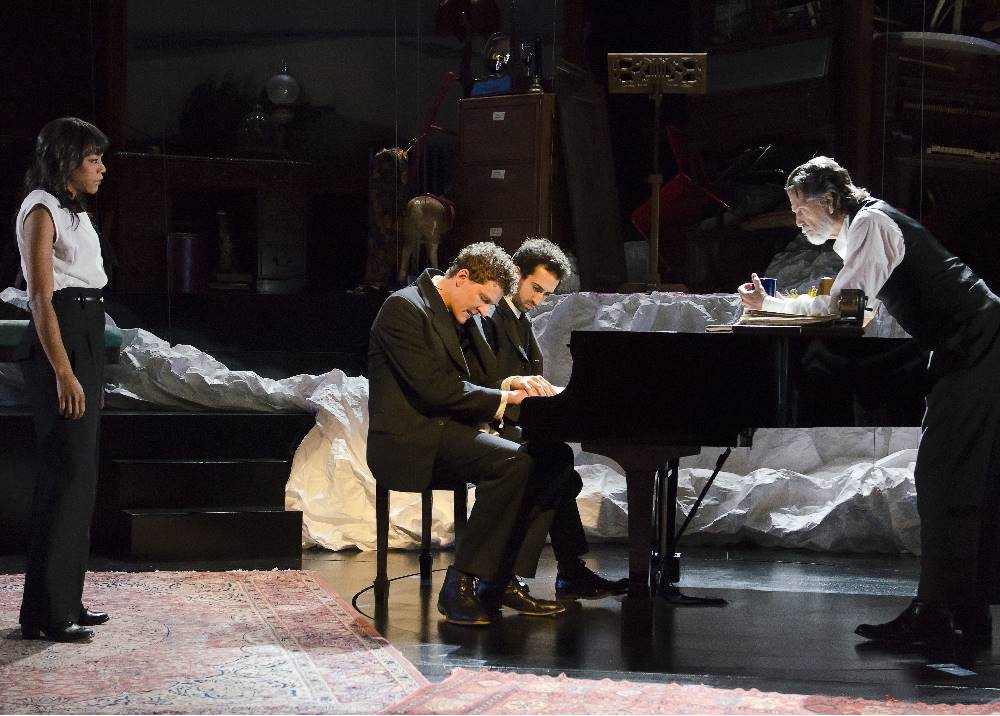NEW YORK CITY: In an alternate, more boring dimension, Dave Malloy’s new show Preludes, about Russian composer Sergei Rachmaninoff, features a Russian-style drawing room and 100-percent accurate period costumes.
But in the version currently running through July 19 at Lincoln Center Theater‘s Claire Tow Theatre, the late Russian composer is split into two people—one an actor, the other a pianist—wearing contemporary black suits, on a set featuring a modern-kitchen and a (literal) mountain of chairs. And Rachmaninoff’s famed concertos are not only played on the piano but on a synthesizer.
“[Director Rachel Chavkin] and I weren’t interested in the literal representation of the play,” said Malloy during a recent rehearsal of Preludes. “We wanted to show that the music is from 1900 and 2015.”
A similar merging of old and new was present in Malloy’s previous work Natasha, Pierre & the Great Comet of 1812, which ran Off Broadway in 2013; inspired by a portion of Leo Tolstoy’s War and Peace, it combined Russian folk and showtunes with electropop. But while Great Comet was a sweeping and opulent exploration of Moscow high society, Preludes is more insular and personal. It takes place, as the playbill put its, in “the hypnotized mind of Sergei Rachmaninoff.”
Preludes is set in Moscow in 1900, where, after a disastrous presentation of his First Symphony, Rachmaninoff falls into a deep depression, complete with writer’s block. With the help of hypnotherapist Nikolai Dahl, the composer eventually overcomes the block and completes his famous Piano Concerto No. 2 in 1901.
The musical reunites Malloy with a number of Great Comet collaborators: director Chavkin (who has a development credit on Preludes), set designer Mimi Lien, costume designer Paloma Young, sound designer Matt Hubbs, and music director Or Matias (also the piano-playing half of Rachmaninoff). There’s even a literal Natasha leftover: an upstage gold column was a set piece from that show.
Malloy explained more about how he incorporated Rachmaninoff into his original score, and why he’s so fascinated with Russia.

So what’s with you and Russian authors?
I don’t really know! I grew up Latvian, which is close to Russia and was part of the USSR for a while. So I grew up with a kind of Slavic upbringing. But I don’t know. I think I’ve just always responded to both Russian literature and Russian music. There’s a deep existential melancholy to it all that I really respond to.
What is your relationship to Rachmaninoff?
I played a lot of his music in college while I was studying piano. My high school choir teacher first introduced me to him. He would sometimes play some of Rachmaninoff’s Preludes as we would walk in for choir practice and I was like, “What is that?” And then my college piano teacher would play on Wednesday night at a local bar, Wings and Rings. He would play jazz standards and popular tunes, but if enough of the classical piano department got there, he would start pulling out classical warhorses. Rachmaninoff was always a big request on those nights; he would play these crazy Preludes at this crazy bar in this college town.
Why were you so fascinated by Rachmaninoff’s story?
It was the hypnotherapy. That was such a weird little chestnut—in the 1900s, he would go see a hypnotherapist to overcome writer’s block and depression. That just seemed like such an amazing story to me. This was when hypnotherapy was invented, right at the turn of the century. And the piece of music that he wrote as a result of this was his second piano concerto, which is my favorite piece of his, and an amazing piece of music. So just knowing that that piece of music came about through hypnosis—it just seemed like a fertile topic.
How did you incorporate Rachmaninoff’s romantic style into your own music?
I feel like my musical aesthetic kind of draws on a lot of things. For me, this is just one piece of it. I definitely do love these kind of sweeping, lyrical themes. For me this show is a fun opportunity to delve into that aspect of my palette.
With synths?
With synths. There’s kind of this amazing tradition of early synthesizer players adapting classical music. Actually, there’s a very famous recording of Clara Rockmore playing Rachmaninoff’s “Vocalise” on the theremin. And this is recording from 1934, right when the theremin was invented. That recording has been a piece I’ve just loved for a long time. When I think of Rachmaninoff, I think of that recording.
So when [Rachel and I] came to deciding what the orchestra was going to be for the show, obviously we were going to have a grand piano in the center. And then since its a piece set in a pianist’s mind, it just made a lot of sense if the rest of the band was all keyboard instruments. At one point we talked about, “Are there accordions or organs or harpsichords?” But just thinking about that Clara Rockmore piece, I felt like I wanted this old-school synthesizer sound.

You’re also the script or bookwriter on this piece, as you were on Great Comet. How do you find the balance between the script and the music?
I think it depends on the piece. Definitely with my last few works, the answer would be really different. With Great Comet, there’s a huge story to tell, so the storytelling there really took precedent. Obviously the score and the music is really important to me, but we wanted to make sure we were telling a really clear story and that Pierre’s arc and Natasha’s arc were really well-sculpted and told.
With Ghost Quartet [in 2014 and 2015], the answer is the exact opposite; that is a purely musical piece where there’s a hint of a story bubbling underneath it, but it’s way more about the music and kind of the themes of the piece.
Interestingly, I feel like this piece kind of lives in between those two worlds. There is a narrative story here, but really it’s more of a surreal, dreamy piece where we’re looking at these disconnected little moments in Rachmaninoff’s life that accumulate to tell a bigger story. But there’s actually less music in this piece than in most of my other pieces. This piece has a lot more book scenes.
Is that a strange experience for you?
It was a new experience for me. This is definitely the first time I’ve felt like a playwright, which is new, as opposed to a lyricist or a librettist. I enjoyed it. I’m definitely interested in telling stories through music; that’s the reason I do theatre as opposed to having a band. That’s what super-appeals to me. In all of my pieces, even when the music is the more important thing, like in Ghost Quartet, it’s still a piece of theatre.
But I definitely will always identify as a composer first and above all else. I can’t imagine I would ever write just a play. That seems crazy.
How much of Rachmaninoff’s music is in Preludes?
His music is all throughout. He’s written more music in this show than I have! We’re using a lot of his pieces as underscoring. So there are a lot of scenes that were written to his pieces, and one song is a piece of his that I’ve written lyrics to. Even most of my original songs are taken from fragments of melodies of his that I’ve turned into new pieces. There’s very little of this music that’s 100 percent me.
Is it maybe a 70/30 kind of thing?
I don’t know the math. One of his most famous pieces is Rhapsody on a Theme of Paganini, that’s him taking a piece of Paganini and turning it into a piece of music. So I’m doing that with him; these are Rhapsodies on a Theme of Rachmaninoff.
Another piece that features prominently into this show is a piece of his called “Fate,” which is based on Beethoven’s Fifth Symphony—it’s the piece he played for Tolstoy and had a famously terrible experience. So again, [Preludes is] falling into this tradition of classical composers riffing off of other classical composers.


